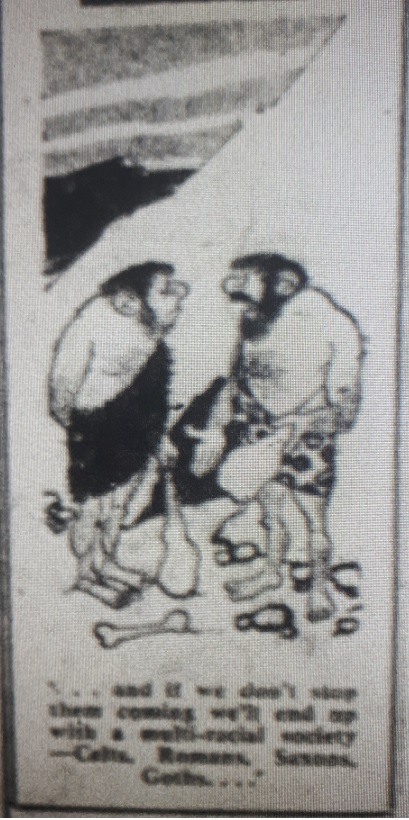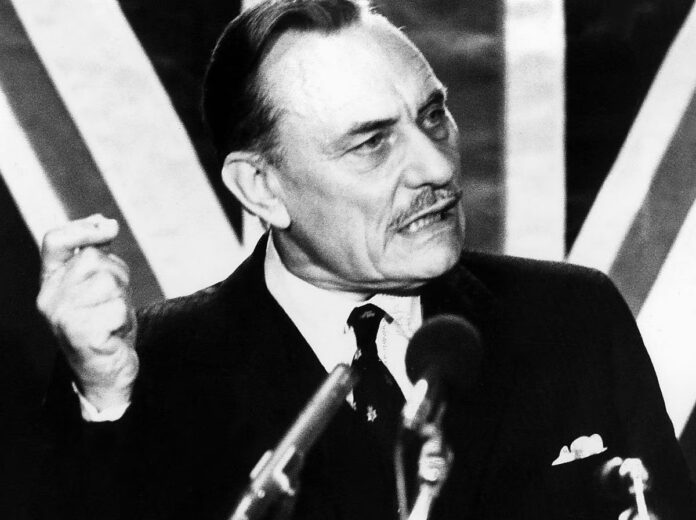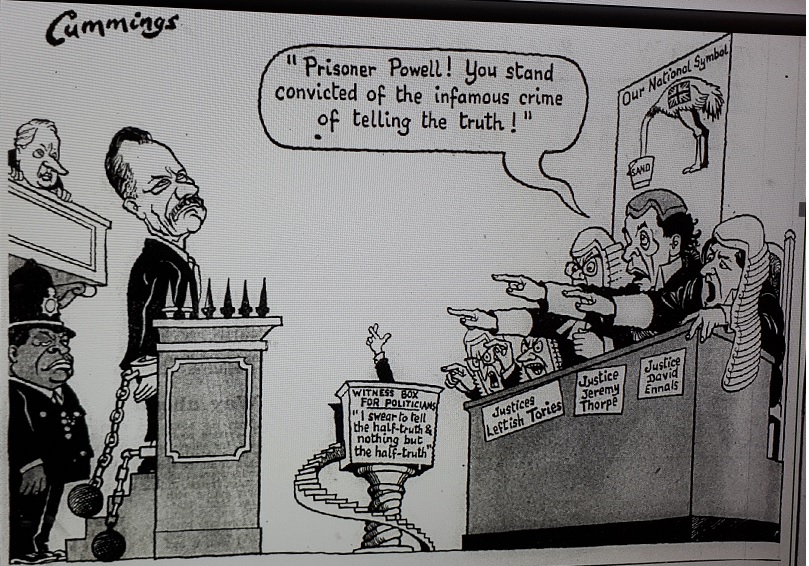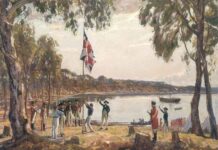From Patriotic Alternative.
Ben Harrison
In the first part of my analysis of how Enoch Powell’s famous ‘Rivers of Blood’ speech in 1968 was reported on in the newspapers I looked at the Daily Mirror, the Guardian and the Times. In the second and final part, I look at the Daily Telegraph, the Daily Express and the Daily Mail.
The Daily Telegraph
I’d expected the Daily Telegraph to have been supportive, partially because I’d expect the kind of people writing for it in 1968 to have been a bit behind the times and not to have caught up with post-war thinking on race, and also because Enoch Powell wrote an article published in the Telegraph the year before about Britain’s “race problem”, which you can read here.
The general tone was that Powell was right even if his language was excessive. This article written by the deputy editor agreed that a multi-racial society would not work, used quite inflammatory language even for its own time, and generally reads like something from the nineteenth century. Ignoring the sections which might get me arrested for hate speech if I repeated them here, it ended:
“There is only one honest course for Britain to pursue on colour, and that is to harness all the generosity and idealism at present wasted in the hopeless effort to impose a multi-racial society to the task of voluntary repatriation on such terms that those who seized their opportunities to return home would have good cause – as would the countries themselves – to bless the name of Britain.”
The standard of discourse was very high by modern standards and the kind of language used was much more formal than any publication you can find today, even including the letters written by members of the public. 97 percent of its readers believed that Edward Heath had been wrong to sack Powell from the Shadow Cabinet.
Despite its stance, it actually covered the reaction to the speech by ethnic minority groups more than other newspapers. It reported that the West Midlands Caribbean Association had invited Powell to address them and, should he decline, they had vowed to attend his monthly surgery “en masse”.
Another article referred to “the actual malignity of our rulers” in allowing things to get to this stage in the first place, the only time anybody suggested that mass immigration may have been encouraged with malicious intent.
All newspapers referred to ‘racialism’ as a valid concept that had already been implanted into the public consciousness, though the Telegraph referred to it as a “favourite left-wing catchword”.
The Daily Express
The Express gave the speech the most positive coverage out of all newspapers, and like the Daily Mirror it had a Powell-related story on the front page for five days in a row.
It had the most pro-Powell editorial, whose argument wasn’t explicitly racial in tone but read “The British have the right to determine their own national destiny… there must be an anxiety to ensure that the voice of the majority is given its due weight”.
A second article ended by saying that “most decent people know that if we are to have racial peace in the future, immigration must be almost totally stopped”.
A third acknowledged that there was “immense support” for Powell’s views and that his line was “a clear vote-winner”, yet still raised the spectre of the mythical evil far-right bogeyman lurking in the shadows waiting to pounce if Powell was not listened to.
The same article concluded by saying that the challenge for the Conservatives was to respond to public opinion, or else “leave the field open to a party which might well include in its programme much which Mr. Powell would profoundly deplore – including the destruction of our parliamentary democracy”. It wasn’t the only newspaper to imply that what really mattered most was preserving our political system.
A large number of workplaces went on strike in support of Powell even though his speech had nothing to do with their working conditions, and the biggest and most famous of these strikes were held by dockers in London, who went against the instructions of their own unions in doing so.
Hundreds of dockers marched on Parliament to hand in a petition to Enoch Powell and meet with their own local MP. It appeared to have largely passed off peacefully, with them reported as having sung songs such as “White Christmas”, except for a brief scuffle after a man in the lobby of the Houses of Parliament was said to have called them “white trash”.
A poll of the Daily Express’s readership found that 79% agreed with Powell’s views, and out of the 500 letters it received only two were critical. Some of the letters which it printed were the most overtly ethnocentric out of all newspapers I read, though one letter which was highly critical of Powell was identical to one published in the Telegraph written by exactly the same person.
The Daily Mail
Many of us will have heard of that famous 1934 “Hurrah for the Blackshirts” article where the Daily Mail wondered out loud if fascism might be a better form of government than parliamentary democracy – that is, until the advertisers vowed to shut it down.
Nowadays though, it concentrates on serving up cheap outrage about all that’s wrong in the world to wind up people who don’t understand the idea of controlled opposition, up until somebody comes along with actual solutions to the problems, at which point it turns 180 degrees and denounces them even more hysterically than anybody else.
I expected a very lukewarm response or even a negative one, and as it turns out I was right. There seemed to be slightly less coverage of it than certain other newspapers. There wasn’t nearly as much hyperbolic language used as would be the case today, though Powell’s speech was referred to as a “bizarre outburst”.
The general editorial stance was “don’t divide us”, and that “it would be a disaster for democracy if people now began to desert the Conservative Party because it has lost touch with its ideals, which would have been the danger if Powell’s view had prevailed” – whatever all that means.
A reporter wrote back from Wolverhampton, or “Powell-land” as he put it, with a story which definitely wasn’t made up whatsoever of Indians and Jamaicans happily playing darts in the pub together with English people, every one of whom then went on to say that Powell was right. It seems that the Daily Mail’s annoying habit of putting certain words in headlines in all capital letters is nothing new either.
And oh dear, apparently we got invaded by groups very similar to us thousands of years ago so we’ve always been multi-racial and what’s happened since the Windrush is just par for the course:
 One of the main leaders of the Smithfield market porters’ protest, who Edward Heath referred to as a “racial agitator” (the term “far-right extremist” didn’t appear in any newspaper and presumably hadn’t been invented yet) was revealed to be a former candidate for Oswald Mosley’s Union Movement. Some other newspapers published the man’s name, but only the Daily Mail doxed him with his photo.
One of the main leaders of the Smithfield market porters’ protest, who Edward Heath referred to as a “racial agitator” (the term “far-right extremist” didn’t appear in any newspaper and presumably hadn’t been invented yet) was revealed to be a former candidate for Oswald Mosley’s Union Movement. Some other newspapers published the man’s name, but only the Daily Mail doxed him with his photo.
There was one interesting letter from an obviously intelligent young university graduate who had always thought of herself as free of any kind of prejudice, but who had re-examined her views after hearing the speech and instinctively come to understand that Powell was right.
Despite the letters they received from readers being supportive of Powell by a ratio of 50:1, at no point did the Daily Mail acknowledge that he represented the majority opinion of the country.
Conclusion
All newspapers except perhaps the Daily Mirror used more intelligent language and were more serious in tone than their equivalents today, with much less of the absolute rabid hostility towards anybody who stands up for the interests of white people that we’ve come to expect. There is no doubt at all that the media has been significantly dumbed down in the past few decades as well as being weaponised against us.
The concern was much more on race relations in the there and now instead of the long-term destiny of the country, and it was hard to disassociate the coverage of the Race Relations Bill with coverage of the Powell speech.
In 1968 non-whites were estimated to make up only two percent of the population. No newspaper tried to predict what things would be like after the year 2000 or acknowledged that they could ever become more than a relatively small minority if trends continued indefinitely.
Despite Edward Heath condemning the “nasty, vicious reaction” to Powell’s speech, there were no specific reports of what would now be referred to as hate crimes.
There was also no use of the terms “white supremacy”, “multicultural”, “Windrush” or “diversity”, and only one use of the term “far-right” (in the Times article about the National Front). There were plenty of references to 1930s Germany as a path we need to avoid going down at all costs but not as many as you would expect today now that it’s the only period in history that a lot of people know anything about.
Across all newspapers there was much more in-depth coverage of goings-on inside the House of Commons than you would expect now as if it genuinely mattered.
There was also a strong focus on what the fallout from the speech meant for the future of the Conservative Party even though they weren’t in office; there was surprisingly very little coverage of what Harold Wilson thought of it all considering he was prime minister at the time.
Even the newspapers which were hostile to Powell still largely spoke of non-white immigrants, whether from the West Indies or the Indian subcontinent, as if they were a monolithic ‘other’ and not really a true part of this country despite living in it. White immigrants weren’t taken into consideration at all and there was no question of it “not being about race”.
All six newspapers described non-whites using the term “coloured” and most used terms such as the “racial problem” or some variation of the same, and no article written about the speech in the week afterwards appeared to have been written by a non-white journalist.
Non-whites were also conflated with immigrants as being one and the same, and there was only the briefest of mentions of any non-whites who had already been living here before 1948.
All the analysis was made from the perspective of white people being in the dominant position. There was no acknowledgement of the prospect that non-whites may one day not necessarily ‘have the whip hand’ over white people but may certainly come to be in positions of authority over us, and may completely transform the sense of Britain being fundamentally a white country that people in 1968 took for granted.
Perhaps the most moving thing about reading those newspapers was the letters from members of the public: normal, decent people who took great pains to explain that they weren’t prejudiced, but who hadn’t grown up in a multi-racial Britain and didn’t understand why they were now being expected to share their towns with the rest of the world without having a say in the matter. Voices from before I was born, wanting to know when all this was ever going to end.
We know exactly what caused the Windrush to arrive here but the definitive book explaining what exactly happened in the key institutions of society in those twenty crucial years between then and the Rivers of Blood speech hasn’t been written yet, though mechanisms were obviously in place to make sure that Britain was going to be made into a multi-racial society come what may.
I’ve spent so much time reading newspapers from 1968 recently that it feels like I’ve just been on a week’s holiday there. Most of us will have grown up after then, but I bet many of us still find it comforting to imagine that things in this country were fundamentally alright when we were too young to be politically conscious.
Britain in 1968 certainly sounds like a better society than Britain in 2023, but there was nothing about our system of governance or our liberal sense of morality more generally at that time which would have stopped us from eventually getting to the situation we are in now, which makes any form of nationalism based on nostalgia for the recent past a complete non-starter.
From Patriotic Alternative.








